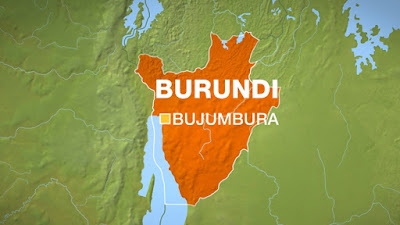The United Nation’s Security Council has agreed to send its police force to Burundi in other to subdue the violence and human right abuses in the country.
More than 400 people have been killed in unrest since President Pierre Nkurunziza said he would run for a third term in office last April.
More than 200,000 people have fled their homes.
“Given an increase in violence and tension, the Security Council must have eyes and ears on the ground to predict and ensure that the worst does not occur in Burundi,” French UN Ambassador Francois Delattre told Reuters.
“This is a strong act of preventative diplomacy,” he added.
Burundi earlier said it would accept no more than 50 police officers.
The government of Burundi earlier warned that it would agree to no more than 50 UN police officers.
Diplomats are now negotiating how to implement the UN Security Council’s resolution.
Although both Burundi’s opposition and government forces are ethnically mixed, some fear that the violence could descend into a repeat of the genocidal killings which the country has previously experienced.
Protests in Burundi after UN decides to send police
However, shortly after UN agreed to send police, hundreds of people marched in Bujumbura to protest the Security Council decision to send up to 228 police officers to Burundi.
Around 1,000 people have marched through the streets of Burundi's capital, Bujumbura, to protest against a UN decision to send a police contingent to monitor the security and human rights situation in the country.
Saturday's demonstration came a day after the UN Security Council agreed to deploy up to 228 police personnel to Bujumbura, and throughout Burundi, for an initial period of a year.
More than 450 people have been killed since President Pierre Nkurunziza pursued and won a third term last year, a move his opponents say violated the constitution and a peace deal that ended a civil war in 2005.
Tit-for-tat violence by rival sides has left both government officials and members of the opposition dead, with more than a quarter of a million people fleeing the violence.
French embassy march
Led by Freddy Mbonimpa, the mayor of Bujumbura, the protesters marched peacefully on Saturday to the French embassy, angry at France's drafting of the UN resolution to send the police squad.
One demonstrator carried a banner saying that it was France that needed UN peacekeepers, making a reference to a lorry attack in the southern French city of Nice that killed 84 people.
French ambassador Gerrit van Rossum, who went out to address the crowd, said there was "a deep misunderstanding" about France's role at the UN security council.
He said there was "no problem" at the demonstration.
The crowd also protested outside the Rwandan embassy, accusing the neighbouring country of training Burundi rebels.
Nkurunziza's government has previously said it would only accept up to 50 unarmed UN police and that its sovereignty must be fully respected.
The UN needs approval from Burundi's government to send the police force.
France had drafted the UN resolution to send the controversial police squad [Reuters].
Four of the 15 council members abstained from Friday's vote.
"Given an increase in violence and tension the Security Council must have eyes and ears on the ground to predict and ensure that the worst does not occur in Burundi," said Francois Delattre, the French UN ambassador.
However, Samantha Power, US ambassador to the UN, said Friday's resolution was not strong enough and that the UN police would simply be observers to Burundi's problems.
She warned that the situation was "all but certain to deteriorate".
"It is not at all clear to me that a council that says repeatedly that it has learned the lesson of Rwanda has in fact done so," Power said.
"Police are not being deployed to protect civilians, even though civilians are in dire need of protection. That should embarrass us."
The UN needs approval from the Burundi government to send the police
Al Jazeera's Daniel Lak, reporting from the UN headquarters, in New York, said: "The ability of 228 police officers who are basically monitoring human rights and helping build capacity and reporting back to headquarters - they're not really going to be able to do much to stop violence. But it is a symbolic move by the Security Council.
"They'll be telling the world what’s going on there, and that's the key - the international community is back in Burundi."
Council veto power China, along with Angola, Egypt and Venezuela, abstained from the vote.
"On the question of sending United Nations police to Burundi, it is necessary to respect the sovereignty, independence and territorial integrity of Burundi," Liu Jieyi, China's UN ambassador, told the council.
He said the resolution did not reference these principles, which is why China abstained.
POST A COMMENT
Please share your thoughts in the comment box below:
Tweets by newsnetworkngr


